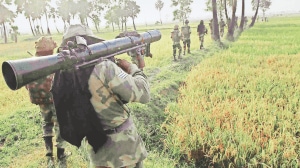Blacklisted suppliers floated fake firms and kept tapping into Navy for secrets
Despite an official ban on defence agents, the free run and access to high-security military establishments enjoyed by dubious consultants, even whose companies have been blacklisted, has again been exposed in the War Room leak case.

Despite an official ban on defence agents, the free run and access to high-security military establishments enjoyed by dubious consultants, even whose companies have been blacklisted, has again been exposed in the War Room leak case.
The chargesheet in the case alleges how two defence suppliers, Kulbhushan Parashar and Ravi Shankaran, after seeking premature retirement from the Navy set up one equipment-supply shop after another and for almost two years got access to military secrets out of top-ranking serving personnel.
Their first joint venture ended in a disaster. Parashar (arrested) and Shankaran (still absconding) set up a company called Shanx Oceaneering, and among others, supplied spares and equipment to the Bhabha Atomic Research Centre, the Nuclear Power Corporation and the Navy.
In 1997, Shanx Oceaneering was blacklisted due to an explosion on Naval ship, INS Jyoti. But that did not break up the partnership. The duo set up three other companies: Interspiro India (subsidiary of Interspiro of Sweden), Expert Systems and Unitech Enterprises.
Other front companies were also floated, and though Parashar frequently flaunted their visiting cards, the companies were found to be non-existent.
In 2003, Parashar started working for Atlas Defence Systems and Atlas Telecom, of which Abishekh Verma was a founder Director.
That is when the business of the clique took a quantum jump, the chargesheet says. And coincidentally, some of their ex-colleagues got posted in sensitive posts in the Navy and IAF. Shankaran, for instance, knew accused Commander Vijender Rana since they had both attended a marine commando course. And Parashar had kept in touch with Rana, ever since they were on a diving course.
Once Rana was posted in the highly sensitive Directorate of Naval Operations (DNO), their friendship became a ‘‘close relationship’’ later described by the CBI as a ‘‘conspiracy,’’ of which the other accused officer, Wing Commander S L Surve, Joint Director, Air Defence was a part.
The chargesheet states: ‘‘Parashar offered them favours/ gifts in cash/kind and invited them to extravagant parties. Investigation has revealed that in lieu of these favours extended to these officers, sensitive information was traded off. This compromised sensitive information has direct adverse effect on the present and future of the country.’’
The CBI has described as ‘‘unique’’ the modus operandi of transmitting the secrets by the defence personnel to the arms dealers. Sensitive information was obtained using “latest electronic gadgets in the form of digital data by using pen drives, use of electronic mails, scanner, fax machine, internet messaging, voice over internet protocol using Skype software.”
It was the forensic examination of the computer hard disk used by Vijender Rana that led to entire Skype conversations between Rana and Ravi Shankaran being recovered. The CBI’s chargesheet lists snatches of some of these conversations which reveal how a clear commercial purpose was being served by the transmission of secret documents to the ex-Naval officers.
(Tomorrow: The Navy that leaked like a sieve.)



- 01
- 02
- 03
- 04
- 05




























